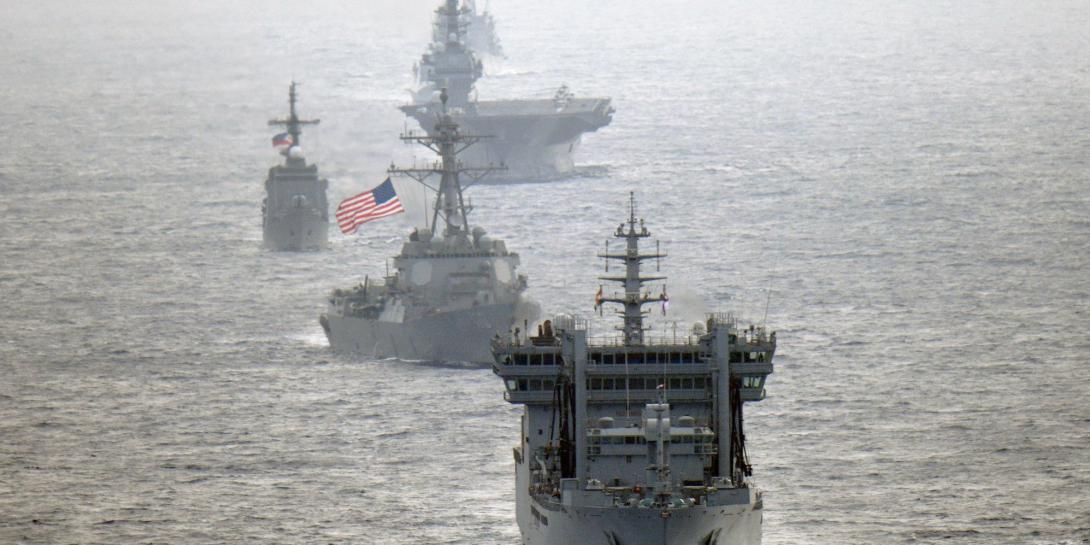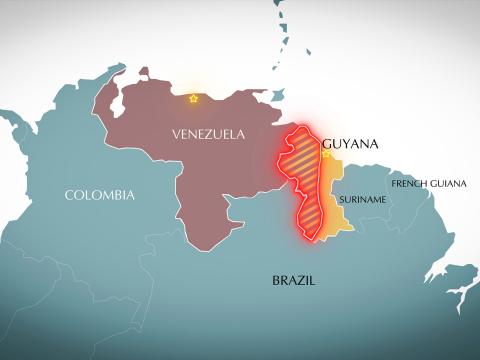China’s Insecurity Masks Budding Superiority
In its quest for global supremacy, China has overtaken the United States in some areas but remains uncertain of its own position in head-to-head competition. The United States can take advantage of this status, but must be careful of overconfidence.
These were two key points expressed by Rear Adm. Michael Studeman, USN, director of intelligence/J-2, U.S. Indo-Pacific Command (INDO-PACOM). Speaking at a virtual AFCEA Hawaii Chapter luncheon, Adm. Studeman cited these elements as he focused on seven myths about China.
One of the myths he sought to dash is that China is a near-peer military power compared to the United States. On the contrary, he described a more pessimistic scenario. “China is far more than a near-peer,” the admiral stated. “They are a peer in many categories. They are superior in some.” He continued that the United States is hugely disadvantaged if it has to deploy forces in a contingency operation from the continental United States to China’s border area to face People’s Liberation Army forces already extant in the region.
But that does not automatically mean that China is ready for conflict. “The Chinese have their own set of fears,” Adm. Studeman declared. “They overestimate the United States and they underestimate themselves.” He continued that this is a perception the United States hopes to sustain over time, but the United States remains concerned that China could use its military power to assertively pursue sovereignty claims.
“I think it’s great hubris or arrogance that the United States continues to hold onto this idea that there couldn’t be a competitor that actually could build things, that would have technological prowess that would exceed the United States or build in numbers that could overwhelm our forces,” he continued. “These are the realities of our times; and if we don’t get square with it, then we’re going to find ourselves in a disadvantageous position, and we’ll be less motivated to actually do what is required to make sure that we can hold our own, and then some, in any kind of contingency that deals with China.”
Adm. Studeman added that while China is a pacing threat, the United States hopefully will not be outpaced as it moves forward. China’s speed of modernization is robust and multidecade in nature. “Let’s pray that our reputational deterrence holds for as long as possible here,” he said.
The INDO-PACOM intelligence director emphasized that, rather than seeking simply great power status, China is seeking “the greatest power” status. He also dashed as a myth that China seeks regional hegemony. Instead, it seeks global supremacy that would make it the dominant power in the world.
A related myth is that great power competition is the United States versus China and/or Russia. The admiral offered that the United States will lose the great power competition if it does not recognize that it actually is a “community of nations struggle” that requires the United States acknowledge that it must invest in sharing with other powers and in warning them about Chinese and Russian moves. The allied nations must be partners in the great power struggle instead of being forced into a competition in which they have to choose one nation or another. They might view themselves as caught in the middle, and a better approach is to enlist them in an effort to counter another nation's actions that run counter to their values.
And, despite what many people may think, it’s not all about deterring China from attacking Taiwan. Neither is the confrontation about the South China Sea and China’s expansionism there. Deterring or defeating in combat is important, but the United States wants to win without fighting, Adm. Studeman said, adding that, “Winning without fighting will not occur if we have a complacent view of China or we can’t see that it is a multinational effort to shape the environment that can constrain Chinese malign actions and can deal with brazen tactics, intimidation and coercion, bribes, propaganda—all these things that are ever-present in our international environment.”
Another myth plays on the doctrine of inevitability: China is destined to overtake the United States as the Western superpower declines. Adm. Studeman not only rejected that as a false prophesy, he also stated that China’s self-described “unstoppable ascent” is largely due to the United States. “A lot of their advances are on our backs,” he declared, noting that most of China’s advancement is the result of intellectual property theft from the United States. U.S. institutions are stronger and freer, and China’s one-child policy has stunted its demographics by giving it an aging population with a shrinking workforce, unlike the United States.
“It doesn’t matter how fast the United States drives its STEM car,” he analogizes. “If the Chinese are always in the back seat, they always are going to be able to go at the same speed as the United States.”
To look ahead with China, the United States needs to look back, the admiral offered. “What we need to do to deal with this threat has a lot of characteristics of what we did in the Cold War,” he stated. “[It] was to pay attention everywhere and to make sure we were advancing the ball and doing the right thing as we dealt with a comprehensive threat.”
If China has an Achilles Heel, it is the economy. China must manage its economy carefully, because if it crashes all of China’s plans go with it, Adm. Studeman offered. “If the economy collapses or fails, the leaders lose their mandate and they may have some infighting and power struggles,” he said. “The Chinese are helping to prevent the economy from backsliding in any way. That is their greatest fear, because if that happens, the bassist fear in China is that stability is going to be affected. If the economy goes, things start to totter, then you have an unstable China with a great deal of protests and breakaways, and chaos ensues. That goes right to the Chinese psyche of how its history went from convulsive change to convulsive change.”




Comments